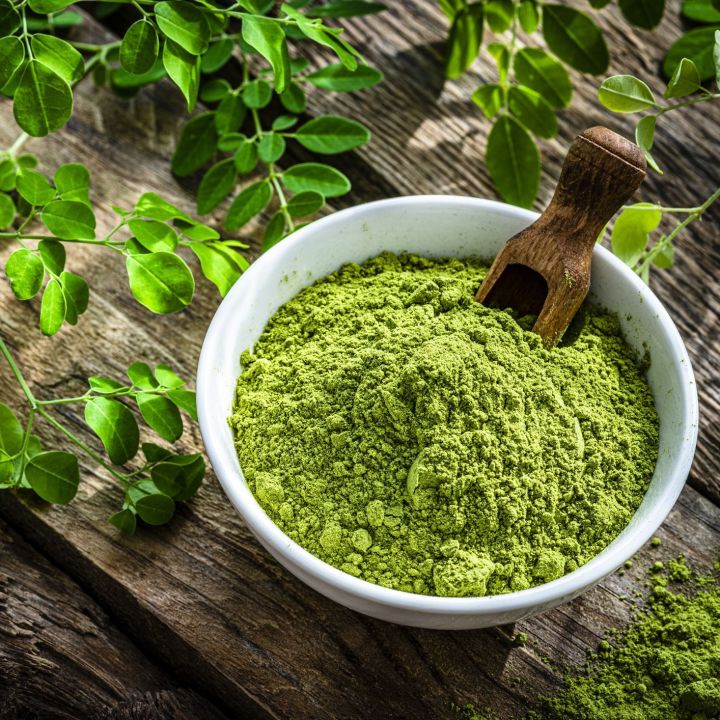Every few years, a new “superfood” dominates wellness conversations from matcha and spirulina to turmeric. Today, that spotlight is on Moringa, often called the Miracle Tree. Health enthusiasts claim it boosts energy, balances hormones, and offers more nutrients than green tea. But how true are these claims?
This article breaks down the science, nutrition facts, and myths around Moringa and whether it deserves the same status as green tea or if it’s just another wellness fad.
What Is Moringa?
Moringa oleifera is a nutrient-dense tree native to South Asia and Africa. Every part leaves, pods, and seeds is edible and used for food or medicine. Traditionally, it’s been part of Ayurvedic and folk remedies for centuries to treat fatigue, inflammation, and digestive issues.
Today, Moringa is available in several forms:
-
Powder – dried and ground leaves, ideal for smoothies or tea.
-
Capsules – for convenience and consistent dosage.
-
Tea – caffeine-free with a mild, earthy taste.
-
Oil – used in skincare for its antioxidant properties.
Its rapid rise in the global wellness market has earned it the label “the next green tea.” But does it live up to the comparison?
Why People Compare Moringa to Green Tea
Green tea has long been praised for its antioxidants, metabolism support, and detox effects. Moringa is gaining similar attention for offering comparable and in many cases, superior nutritional benefits. Both are natural, plant-based, and used for energy, weight management, and overall health.
Key similarities:
-
High in antioxidants
-
Supports metabolism and energy
-
Used for detoxification
-
Promotes healthy skin
However, Moringa offers one major advantage and that is it’s naturally caffeine-free, making it suitable for those who want an energy lift without jitteriness.
Moringa vs Green Tea: Nutritional Comparison
| Nutrient/Property | Moringa Powder (per 100g) | Green Tea (per 100g dry leaves) | Verdict |
|---|---|---|---|
| Vitamin C | 200 mg | 6 mg | Moringa wins |
| Calcium | 400 mg | 10 mg | Moringa wins |
| Iron | 28 mg | 0.3 mg | Moringa wins |
| Antioxidants | Very high (quercetin, chlorogenic acid) | High (EGCG, catechins) | Comparable |
| Caffeine | 0 mg | 20–40 mg | Moringa wins for caffeine-sensitive users |
Summary: Moringa delivers higher micronutrients per gram compared to green tea. It’s richer in vitamins, minerals, and plant compounds that support immune function, energy, and metabolism.
Science-Backed Benefits of Moringa
-
Rich in Antioxidants:
Moringa contains quercetin, chlorogenic acid, and beta-carotene, which help neutralize free radicals and reduce oxidative stress which is a key for anti-aging and cellular protection. -
Supports Blood Sugar Control:
Research published in the Journal of Food Science and Technology (2014) found that Moringa leaf powder reduced fasting blood glucose levels in diabetic subjects. -
Boosts Energy and Focus (Without Caffeine):
Its iron and B-vitamin content supports oxygen transport and metabolism, providing natural energy without dependence on caffeine. -
Anti-Inflammatory Properties:
Moringa’s isothiocyanates help reduce inflammation, potentially benefiting those with arthritis or chronic fatigue. -
Supports Skin and Hair Health:
High antioxidant and vitamin E levels help reduce oxidative damage and improve collagen production, leading to clearer skin and stronger hair.
Where the Hype Goes Too Far
Despite real benefits, Moringa is not a miracle cure. Marketing often exaggerates claims like “instant detox” or “overnight weight loss.” Here’s the truth:
-
Moringa doesn’t detox your body overnight. Detoxification is handled by the liver and kidneys. Moringa only supports these organs through nutrients.
-
Weight loss results vary. Moringa may support metabolism but works best alongside balanced diet and exercise.
-
Overuse can cause side effects. High doses may lead to digestive discomfort or lower blood pressure excessively.
-
Quality matters. Many cheap powders are low-grade or diluted with fillers, reducing effectiveness.
Always choose organic, lab-tested Moringa powder to ensure purity and potency.
What Experts Say
Nutritionists: “Moringa is nutritionally dense, but not a replacement for a healthy diet. Think of it as a daily supplement from nature.”
Herbalists: “Unlike most trending superfoods, Moringa has centuries of traditional use. Its benefits aren’t new; they’re rediscovered.”
Doctors: “It’s safe for most adults, but consult your physician if you’re pregnant, breastfeeding, or on medication for blood sugar or blood pressure.”
Moringa vs Green Tea: The Verdict
| Category | Winner | Reason |
|---|---|---|
| Nutrient Density | Moringa | Higher vitamins & minerals |
| Antioxidants | Tie | Both powerful |
| Caffeine-Free Energy | Moringa | Zero caffeine |
| Taste & Tradition | Green Tea | More established |
| Weight Loss Support | Tie | Depends on consistency |
Final Verdict:
Moringa is not overhyped, it’s undervalued. It offers a broader nutritional profile than green tea and provides clean, sustainable energy without caffeine. While it may never replace green tea’s cultural status, it’s a superior choice for anyone seeking nutrient-dense, natural wellness support.
Conclusion
Moringa isn’t a trend, it’s a proven superfood with measurable health benefits. Unlike green tea, it provides complete nutrition with no caffeine side effects. The key is to choose pure, organically sourced Moringa powder to experience its full benefits.
If you’re ready to add it to your wellness routine, get your moringa powder today and get the benefit of real nutrients your body can use every day.
FAQs
1. Is Moringa better than green tea for weight loss?
Both support metabolism, but Moringa provides more nutrients and sustained energy without caffeine.
2. Can I drink Moringa tea daily?
Yes, daily use is safe and beneficial. Limit to 1–2 teaspoons of powder or 1–2 cups of tea per day.
3. Are there side effects of Moringa?
Mild bloating or digestive discomfort can occur with excessive intake. Avoid high doses during pregnancy.
4. Is Moringa a fad?
No. Moringa has centuries of medicinal use and growing modern scientific backing. The hype is largely justified.



